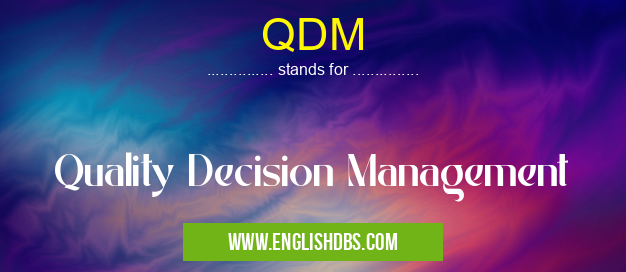What does QDM mean in MANAGEMENT
Quality Decision Management (QDM) is a structured approach to decision-making that aims to enhance the quality of decisions made within an organization. It involves a systematic process that incorporates best practices, analytics, and stakeholder involvement to ensure informed and effective decision-making.

QDM meaning in Management in Business
QDM mostly used in an acronym Management in Category Business that means Quality Decision Management
Shorthand: QDM,
Full Form: Quality Decision Management
For more information of "Quality Decision Management", see the section below.
» Business » Management
Key Features of QDM
- Structured Process: QDM provides a structured framework that guides decision-makers through a series of logical steps, ensuring a systematic and consistent approach.
- Stakeholder Involvement: QDM recognizes the importance of stakeholder perspectives and actively includes relevant stakeholders in the decision-making process.
- Data-Driven Analysis: QDM emphasizes the use of data and analytics to provide evidence-based support for decisions. It involves collecting, analyzing, and interpreting relevant data to inform decision-making.
- Risk Assessment: QDM incorporates risk assessment techniques to identify and mitigate potential risks associated with decision options. This helps decision-makers make informed choices and minimize adverse consequences.
- Continuous Improvement: QDM is an iterative process that allows for continuous improvement. It involves regularly evaluating decision-making processes and outcomes to identify areas for improvement and enhance future decision-making.
Benefits of QDM
- Improved decision quality and effectiveness
- Increased stakeholder buy-in and support
- Reduced risks and uncertainties
- Enhanced organizational performance and goal achievement
- Fostering a culture of informed decision-making
Essential Questions and Answers on Quality Decision Management in "BUSINESS»MANAGEMENT"
What is Quality Decision Management (QDM)?
QDM is a systematic approach to making better decisions by identifying and addressing the factors that influence decision quality. It involves a structured process for gathering and analyzing information, considering alternative options, and selecting the best course of action.
Why is QDM important?
QDM helps organizations make informed decisions that are aligned with their strategic objectives. It reduces the risk of making poor decisions, improves operational efficiency, and enhances stakeholder satisfaction.
What are the key components of QDM?
QDM typically involves defining the decision context, identifying and analyzing decision criteria, evaluating alternative options, selecting the best decision, and monitoring and evaluating its outcomes.
How can QDM be applied in practice?
QDM can be applied to a wide range of decision-making scenarios, including strategic planning, product development, investment decisions, and risk management. It can be used by individuals, teams, or entire organizations.
What are the benefits of using QDM?
QDM offers numerous benefits, including improved decision quality, reduced uncertainty, increased stakeholder confidence, and better alignment with organizational goals.
Are there any tools or frameworks to support QDM?
Yes, there are various tools and frameworks available to facilitate QDM. These include decision matrices, weighted scoring models, and multi-criteria decision-making tools.
What are the challenges of implementing QDM?
Common challenges in implementing QDM include obtaining reliable information, managing stakeholder biases, and overcoming organizational inertia.
How can QDM be integrated into organizational culture?
To effectively integrate QDM into organizational culture, it requires leadership support, training and development, and a commitment to a collaborative and data-driven decision-making process.
Final Words: QDM is a valuable tool for organizations seeking to improve the quality of their decision-making. By adopting a structured and data-driven approach that engages stakeholders and minimizes risks, organizations can make informed decisions that lead to better outcomes, improved performance, and increased stakeholder satisfaction.
